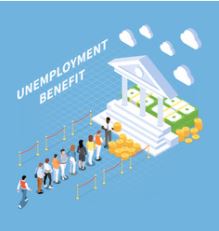It’s TaxQuips time from TaxMama.com®.
Today TaxMama® wants talk to you about the unemployment refund checks the IRS has started to send out.
Yours may be on the way!
Dear Family,
In today’s TaxQuip, I want to reach taxpayers who prepare your own tax returns. Please share this with anyone else who is affected.
Let’s do a little recap on the current situation:
Long after millions of taxpayers filed their tax returns (American Rescue Act in March 2021), Congress decided to help out shocked taxpayers who learned that the unemployment benefits they received during this pandemic are taxable. Congress decreed that the first $10,200 of all unemployment benefits would not be taxable.
The IRS said they would issue the refunds automatically and asked us all not to file amended returns until after they issued the refunds, as I reported earlier.
So, now the refunds are arriving. Now that tax pros have seen how the IRS made their computations, they noted that many of their clients do need to file amended returns. Why?
Frankly, for the IRS to perform a complete computation on each tax return would be so prohibitive that the refunds would be delayed for months. Instead, they took a short-cut. They multiplied the amount of the unemployment exclusion (up to $10,200 or double that for couples filing jointly in community property states) times the taxpayer’s tax bracket.
This computation works really well for people who have jobs that provide health insurance coverage, little or no other income, and don’t have children. For instance, let’s look at a single person’s income of about $42,000, including unemployment income. They would be in the 22% tax bracket. Now, subtract $10,200 and their tax bracket drops to only 12%. This person gets an extra $1,000 of refund. This person isn’t going to want to amend!
But what about people who have children – or more complex tax returns?
Dropping their income by $10,200 will reduce their adjusted gross income (AGI) and might increase their refundable credits (child tax credit, earned income credit and American Opportunity credit). The lower AGI may also increase their right to other deductions or tax credits:
- Suspended real estate losses (up to $25,000) might become deductible
- Non-deductible IRA contributions might now qualify for a deduction
- Student loan interest and tuition and fees deductions are limited by AGI – they might become deductible.
- Taxable advance premium tax credits (insurance from the marketplace) might well turn into refundable credits.
- Yes, we know that Congress waived the taxes for 2020 – but reducing the adjusted gross income might turn those (forgiven) balances due into refunds – this could be a substantial windfall.
Then, look at people who collect Social Security benefits.
Normally those benefits are tax-free. However, when they have other income, like wages, self-employed business income or investment income – or unemployment – up to 85% of those Social Security (SS) benefits can become taxable. Dropping the AGI can bring the income low enough so none of the SS benefits are taxable.
For instance, let’s say a couple is receiving $18,000 of SS benefits each, $2,000 of tax-free interest income, a pension of $20,000 and $10,200 of unemployment benefits (assuming they didn’t get more than that…)
Using live software, we determine that $11,270 of the SS benefits are taxable, resulting in taxes due to the IRS of $1,407. (Details in our files)
When we remove the unemployment from the equation, the taxable income is zero.
The IRS would have sent them $1,020. By filing an amended return, they can get an additional refund of $387.
Depending on the state they live in, they might get additional refunds from the state – although most states don’t tax Social Security income in the first place.
Good News for people with Professionals
Tax professionals will take care of their clients, either now or when you come in for next year’s tax appointment. So, feel free to wait until then – and see what else the IRS does about issuing refunds to those people who paid the penalties because their income was too high for the Premium Tax Credit.
The folks at VITA (Volunteer Income Tax Assistance) have told me that they will be reviewing the 2020 tax returns for all of their clients – and that VITA does have the authority to prepare the amendments for them. At no charge. That means that the teams at TCE (Tax Counseling for the Elderly – often run by AARP), will probably do this as well. You might also be able to get help from the Low Income Tax Clinics, often run by colleges and universities, if you have a problem getting the IRS to accept your amended returns.
In Short
Although the numbers presented may not look enormous, for some households, this can mean thousands of dollars’ worth of refunds. Others – maybe only hundreds. It’s well worth your time to recompute your revised tax liability once you get that IRS refund check. And remember, the IRS will be paying interest on the additional refunds – a lot more than your bank pays.
And remember, you can find answers to all kinds of questions about taxes and business issues, and EA Education, free. Where? Where else? At https://iTaxMama.com/AskQuestion
To make comments please drop into the TaxQuips Forum.



